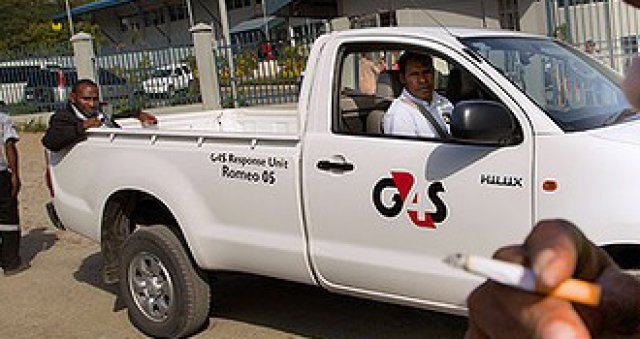
G4S was labelled “fundamentally flawed” in 2005, when its operation of onshore detention centres led to the wrongful detention and mistreatment of Australian resident Cornelia Rau, as well as the detention of Naomi Leong from birth until she was three years old, and several cases of “unsafe and inhumane” treatment of refugees.
But when the former Labor government reopened Manus Island detention centre, G4S was awarded the contract to provide security. Now, human rights lawyers have lodged a formal complaint against the private security firm, saying that for “its failures to maintain basic human rights standards at the facility and protect asylum seekers from harm, G4S has been responsible for significant breaches of its human rights obligations under the OECD [Organisation for Economic Cooperation and Development] guidelines”.
This includes allegations that locally hired G4S guards were responsible for some of the “worst violence against asylum seekers” during the night in February when young Iranian asylum seeker Reza Berati was killed.
The Human Rights Law Centre's director of Advocacy and Campaigns, Rachel Ball, said: “In addition to the violence, the regime of indefinite, arbitrary detention on Manus is itself a violation of international human rights law and conditions under G4S's watch were consistently reported to be cruel and inhumane.”
The centre lodged the complaint in Australia under the OECD's Guidelines for Multinational Enterprises.
The complaint was also lodged in Britain by Rights and Accountability in Development (RAID). Taking aim at the Coalition, RAID executive director Patricia Feeney said: “G4S cannot evade responsibility simply because those violations are sanctioned by the Australian government.”
The complainants made recommendations to bring G4S in line with OECD guidelines.
But the Manus Island detention centre was taken over by Transfield, another private corporation, after the February violence. The camp remains plagued by despair and negligence.
Letters obtained by the Guardian have highlighted the fears of several gay refugees being detained in the camp. Told since their arrival that they would eventually be “resettled” in Papua New Guinea, where homosexuality is illegal, many have suffered more than a year of psychological anguish.
One letter, which was an intended suicide note to the author's mother, reads: “I couldn’t return to Iran and be executed by the Iranian government. Hence living in PNG was not any better, because being gay is considered a crime in PNG as well, and the punishment for such crime is 14 years imprisonment.
“I am so sorry that I was born gay. I never meant to hurt you, mum.
“I wish our boat had sunk in the ocean and stopped me living the most painful year in my life.
“I thought Australia and its people would be my protector, but they taught me otherwise.”
Another Iranian asylum seeker wrote: “I have to hide my sexuality because in this country, like Iran, there are a lot of people — fanatics — whom if they find out anyone is gay they would harass them and maybe even try to kill them.
“I have to hide my personality once again. I have to live as someone else.
“It feels like this is a disease that is consuming me for all these years and society will never leave me alone. It feels like the universe doesn’t want you to live in the serenity of one moment, I don’t know what I have done to the universe, or what it has against me.
“I can’t live one moment without anxiety stress and sadness, it doesn’t let me live happily with anyone who I love or feel love, I don’t know what is my crime that I have to be punished so harshly.”
Like the article? Subscribe to Green Left now! You can also like us on Facebook and follow us on Twitter.